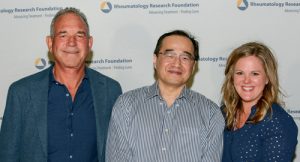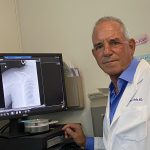GOLDEN BEACH, FLORIDA—On March 23, the Rheumatology Research Foundation hosted an event to announce the first recipient of the Norman B. Gaylis, MD, Research Award for Rheumatologists in Community Practice (Gaylis Award): Sou-Pan Wu, MD. Held at Dr. Gaylis’ home, about 60 people, including representatives of the Foundation and the ACR, attended the event. The venue was selected to personalize the ceremony, bring it closer to where Dr. Gaylis has lived and practiced for nearly 40 years.
The First Recipient
The Gaylis Award is designed to encourage research from physicians in community practice who are engaged in patient care. The award recipient must be a practicing clinician who has an innovative idea for an investigation with the potential to improve rheumatology practice and quality of life for rheumatology patients. Dr. Wu checks all the boxes.
A practicing rheumatologist at Health Partners in St. Paul, Minn., Dr. Wu completed his professional education at Indiana University, Bloomington. He did his a residency in internal medicine at the University of Wisconsin Hospitals–Madison and a fellowship in rheumatology at Yale University, New Haven, Conn. Dr. Wu is board certified by the American Board of Internal Medicine and the American Board of Internal Medicine—Rheumatology.
Dr. Wu’s professional philosophy involves establishing trust between the patient and physician. In his profile on the Health Partners website, he says, “Many diseases in rheumatology are often chronic and difficult to treat. The prognosis and outcome often depend on the trust and cooperation between the patient and the physician. I strive to provide the best care I can by being patient, paying attention to details, practicing evidence-based medicine and staying up to date as much as possible.”
The Hmong Gout Project
With support from the Foundation’s Gaylis Award, Dr. Wu will investigate gout in the Hmong community of Minnesota’s Twin Cities. The Hmong people, who come from Southeast Asia, suffer from a higher rate of gout than the general population and are at a greater risk of comorbidities, including renal failure, joint destruction, early cardiovascular disease and disability. This risk may be a result of cultural barriers and a distrust of Western medicine.
Genetic factors may play an important role in the development of hyperuricemia and intense inflammatory response in the Hmong community. Dr. Wu’s project seeks to identify these genetic factors, develop a genetically based statistical risk model for the Hmong and create a registry for this vulnerable population. An increased understanding of why gout is so common among the Hmong may help physicians provide early detection and timely treatment, as well as prevent associated morbidities. The registry data will add to the current body of knowledge and may help rheumatologists better understand the roles different genetic and environmental factors play in gout development not only among the Hmong, but more generally as well.
“I’m very excited someone who has obviously come up with an idea that definitely is well worth supporting is the first recipient [of the award],” Dr. Gaylis said. “It’s a subject that crosses genetics and ethnic lines. Gout is extremely common and poorly treated in the whole of the U.S., if not the world. More information as to genetic causes will help us develop a better understanding of this condition, and eventually, this could point to potential pathways for improved treatments for patients.”
The Award
This award was established by the Foundation with a generous donation from Dr. Gaylis as a way to encourage practicing clinicians to research their ideas for new and improved treatment for rheumatic disease. “I thought we needed an award unique to clinical practice … [because] I wanted to give something back to my colleagues who are in the same environment I’ve spent my life working in,” Dr. Gaylis said.
Dr. Gaylis was inspired by his own career as a practicing physician and clinical researcher. He wanted to encourage more clinicians to engage in research and explore their ideas, because the majority of rheumatology patients are treated in private practices as opposed to research institutions. In an effort to improve care in his own practice, Dr. Gaylis has developed research protocols to help patients who present with different symptoms.
“I’ve seen and realized that, in clinical practice, there’s a wealth of opportunities for clinical practitioners to do these kinds of studies, but the obstacle for that occurring is the lack of time, support, know-how and economics,” Dr. Gaylis said. That’s where the Gaylis Award comes into play—by supporting clinicians who want to test their own observations through research for the betterment of rheumatology patients and potentially affect rheumatology practice more broadly.
“I wanted to give something back to my colleagues who are in the same environment I’ve spent my life working in,” Dr. Gaylis said. “A clinical rheumatologist is what I am and who I am and where I’ve been successful over the years, so why not create an award that promotes that?
“I’m personally very excited,” he said. “It’s very gratifying to me to be able to make this happen. I just hope we can continue to see this opportunity grow. That’s a key part of this [effort] to increase the visibility of the opportunity. … I look forward to the results of this study—and future studies that receive support—to see if it becomes something very important in the world of rheumatology. That would be the ultimate.”
The Foundation’s Scientific Advisory Council selects an outstanding recipient of the Innovative Research Award for Community Practitioners (IRACP) to receive the distinguished Gaylis Award. Application review and final selection are completed by the Foundation’s Scientific Advisory Council. Dr. Gaylis is not involved in the application review or selection.
The Foundation continues to collect contributions to support this award and keep the associated work going well into the future.
Kimberly J. Retzlaff is a freelance medical journalist based in Denver.




